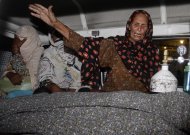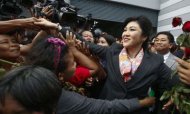
U.N. peacekeepers stand guard during a visit by U.N. Secretary-General Ban Ki-moon to an IDP (internally displaced persons) camp in the United Nations Mission In South Sudan (UNMISS) base in juba
UNITED NATIONS - The U.N. Security Council on Tuesday authorized peacekeepers in South Sudan to focus on protecting civilians instead of state-building activities, backing the use of force by U.N. troops amid worsening violence in the world's newest nation.
The U.S.-drafted resolution, unanimously adopted by the 15-member council, "emphasizes that protection of civilians ... must be given priority in decisions about the use of available capacity and resources within the mission."
Fighting erupted in South Sudan in December after months of tensions sparked by President Salva Kiir's decision to fire longtime rival Riek Machar from the deputy president's position. Deep ethnic divisions also have fuelled the violence, pitting Kiir's Dinka people against the Nuer of Machar.
The council authorized U.N. troops to "use all necessary means" - code for robust military force - to protect civilians, monitor and investigate human rights abuses, assist the delivery of humanitarian aid and support a cessation of hostilities deal.
The two sides fighting in the oil-producing country, which declared independence from Sudan in 2011, have twice agreed to a ceasefire - in January and then earlier this month.
A report this month by the U.N. peacekeeping mission, known as UNMISS, accused government and rebel forces in South Sudan of committing crimes against humanity, including murder, rape and other sexual violence, during the fighting that has left thousands of people dead.
U.S. Ambassador to the United Nations Samantha Power has urged the Security Council to consider imposing targeted sanctions on South Sudan.
South Sudan's U.N. Ambassador Francis Deng told the council, "We should modestly admit that mistakes have been committed by both sides" but that the United Nations still needed to focus on state building.
STARVATION LOOMS
The council almost doubled the number of peacekeepers in late December to 12,500 troops and 1,323 police, allowing the United Nations to bring in reinforcements from other missions. But only about half of the troop surge has been deployed.
The council extended that temporary increase on Tuesday for six months and authorized the deployment of new troop contingents instead of reinforcements. Most of the new troops will come from eastern African nations, U.N. officials said.
U.N. peacekeeping chief Herve Ladsous told Reuters on Tuesday it had been frustrating to find enough troops and the effort was hampered by red tape and a lack of infrastructure and equipment.
The council also expressed "deep concern at persistent restrictions placed upon the movement and operations of UNMISS, strongly condemning attacks by government and opposition forces and other groups on United Nations personnel and facilities."
The resolution effectively endorses action being taken by the U.N. mission in South Sudan, where peacekeepers are protecting some 80,000 civilians at U.N. bases.
More than 1 million people have fled their homes in South Sudan and the United Nations has warned that four million people could be on the brink of starvation by the end of the year because violence had disrupted the crop planting season.













